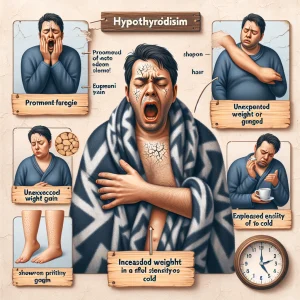Recognize and Understand the Critical Signs and Symptoms of Hypothyroidism
Hypothyroidism is a significant medical condition characterized by the thyroid gland‘s inability to produce adequate amounts of essential thyroid hormones. This butterfly-shaped gland, located at the front of the neck, plays a crucial role in regulating numerous bodily functions, including metabolism, energy levels, and overall health. When the thyroid is underactive, it can lead to a multitude of physiological changes that impact nearly every system within the body. The two primary hormones—thyroxine (T4) and triiodothyronine (T3)—are essential for maintaining healthy metabolic rates. A decrease in their production can result in significant drops in energy, weight fluctuations, and overall well-being, underscoring the importance of identifying and understanding the extensive ramifications of this condition.
Numerous factors may contribute to the onset of hypothyroidism, including autoimmune disorders such as Hashimoto’s thyroiditis, certain prescription medications, prior radiation therapy, or even an inadequate intake of iodine. Awareness of the risk factors and symptoms linked to hypothyroidism is vital, as it can greatly influence your health and quality of life. Often referred to as the body’s “metabolic engine,” a decrease in thyroid function leads to metabolic disturbances, which can show up as weight gain, persistent fatigue, and other debilitating symptoms. Notably, hypothyroidism is more common in women and tends to increase with age. Recognizing these signs and symptoms is essential for seeking prompt medical intervention and exploring appropriate treatment options.
Essential Insights and Information About Hypothyroidism
- Hypothyroidism manifests as insufficient hormone production from the thyroid gland, leading to various physical and psychological symptoms.
- Common signs of hypothyroidism include fatigue, weight gain, dry skin, and increased sensitivity to cold, among others.
- Physical symptoms may also include hair loss, joint pain, and muscle weakness, which can substantially affect daily activities and lifestyle.
- Emotional and psychological consequences can encompass depression, anxiety, and challenges with focus and concentration, potentially exacerbating mental health issues.
- Identifying hypothyroidism in children and adolescents can be particularly challenging, as they may show signs like growth delays, delayed puberty, or academic struggles.
- Diagnosis typically involves blood tests that assess levels of thyroid hormones and thyroid-stimulating hormone (TSH).
- The standard treatment for hypothyroidism generally consists of synthetic thyroid hormone medications designed to compensate for inadequate hormone production.
- Implementing lifestyle changes such as a nutritious diet, regular exercise, effective stress management, and prioritizing sleep can significantly enhance the management of hypothyroidism.
 Recognizing the Common Symptoms of Hypothyroidism in Everyday Life
Recognizing the Common Symptoms of Hypothyroidism in Everyday Life
As you go about your daily routine, various symptoms may present themselves that could indicate an underactive thyroid. A common complaint among individuals suffering from hypothyroidism is a pervasive sense of fatigue. Many report feeling excessively tired even after a full night’s sleep, which can dampen motivation and impede day-to-day activities. This relentless fatigue not only affects physical health but also disrupts emotional balance and overall productivity, leading to frustration and potential health complications.
In addition to fatigue, unexpected weight gain often serves as another prevalent symptom. Individuals may notice an increase in body weight despite adhering to a healthy diet and exercise regimen. This frustrating weight gain typically results from a slowed metabolism due to reduced thyroid hormone levels. Other accompanying symptoms may include increased sensitivity to cold, dry skin, hair loss, and constipation. Recognizing these early warning signs is crucial, as it enables timely medical intervention and effective management of the condition.
Understanding the Physical Symptoms Associated with Hypothyroidism
The physical symptoms linked to hypothyroidism can differ significantly and have a substantial impact on your daily life. One of the most common indicators is a noticeable decline in skin and hair health. Many individuals report experiencing dry, rough, and flaky skin that can lead to discomfort. Hair may become brittle, breaking easily, which can raise concerns about personal appearance and self-esteem, further affecting mental well-being.
Another physical symptom to be aware of is myxedema, which may present as swelling, particularly around the face or eyes. This condition arises from the accumulation of mucopolysaccharides in the skin, resulting in a puffy appearance that can be distressing for those affected. Additionally, muscle weakness and joint pain are prevalent concerns for individuals diagnosed with hypothyroidism. Discomfort and stiffness in muscles and joints can restrict participation in previously enjoyed activities. Therefore, recognizing these physical manifestations is vital for understanding the broader consequences of hypothyroidism on your body and overall quality of life.
Investigating the Emotional and Mental Health Effects of Hypothyroidism
Hypothyroidism influences not only physical health but also significantly impacts emotional and mental well-being. Many individuals struggling with this condition often experience feelings of depression or heightened anxiety that seem disproportionate to their life circumstances. You might find yourself grappling with persistent sadness or a lack of motivation without any identifiable cause. If these feelings continue, they can become particularly troubling and indicative of the deeper effects this condition has on mental health.
Cognitive functions are frequently affected as well, with numerous individuals reporting symptoms commonly referred to as “brain fog.” This cognitive decline manifests as difficulties with concentration, forgetfulness, and a general sense of mental sluggishness. Such challenges can disrupt everyday responsibilities, making it increasingly difficult to manage tasks both at work and at home. Recognizing these emotional and mental symptoms associated with hypothyroidism is essential for seeking the appropriate support and treatment necessary to enhance your overall quality of life.
 Identifying Hypothyroidism Symptoms in Children and Adolescents
Identifying Hypothyroidism Symptoms in Children and Adolescents
Hypothyroidism is not limited to adults; it can also have significant implications for children and adolescents, often presenting differently than in adults. In younger individuals, symptoms may not always be overtly visible. For instance, you may notice signs such as growth delays or difficulty focusing in school. These indicators can easily be misinterpreted as typical childhood behavior or common developmental delays, making it crucial for parents and guardians to remain vigilant and proactive in monitoring their children’s health.
Beyond growth-related issues, children diagnosed with hypothyroidism may also exhibit excessive fatigue or lethargy, which can greatly affect their engagement in physical activities and social interactions with peers. Mood swings and irritability are also frequently observed, as hormonal imbalances can disrupt emotional regulation. If you suspect your child is displaying symptoms indicative of hypothyroidism, it is essential to consult with a healthcare professional for a comprehensive evaluation and testing to ensure their health and developmental trajectory are properly monitored.
Grasping the Importance of Thyroid Function Tests in Diagnosing Hypothyroidism
The Critical Role of Thyroid Function Tests in Accurate Diagnosis
The process of diagnosing hypothyroidism generally begins with thyroid function tests, which are essential for assessing the health and performance of your thyroid gland. The most commonly conducted tests measure levels of Thyroid-Stimulating Hormone (TSH) and free thyroxine (T4). The pituitary gland produces TSH, which is crucial for signaling the thyroid to produce T4. When TSH levels are elevated, it may indicate that the thyroid is underactive and struggling to produce sufficient hormones, suggesting the presence of hypothyroidism.
Understanding Thyroid Test Results for Precise Diagnosis
Simultaneously, assessing T4 levels is critical for determining the severity of the hormonal deficiency. When blood tests reveal elevated TSH levels alongside low T4 levels, this combination typically confirms a diagnosis of hypothyroidism. Understanding the nuances of these tests can help alleviate concerns and provide clarity about your thyroid health, empowering you to take informed steps toward effective treatment.
Empowering Yourself with Knowledge About the Diagnostic Process
Enhancing your understanding of the diagnostic process not only broadens your knowledge base but also empowers you on your health journey. Being informed about how thyroid function tests work and what they reveal about your body fosters more effective discussions with your healthcare provider, enabling proactive management of your health and overall well-being.
 Comprehensive Treatment Options for Effectively Managing Hypothyroidism
Comprehensive Treatment Options for Effectively Managing Hypothyroidism
Upon receiving a diagnosis of hypothyroidism, various treatment options are available to assist you in effectively managing the condition. The most widely utilized approach is hormone replacement therapy, typically involving synthetic levothyroxine. This medication is designed to mimic the natural function of thyroid hormones, helping to restore normal hormone levels, alleviate symptoms, and enhance overall well-being.
Your healthcare provider will work closely with you to determine the appropriate dosage tailored to your specific needs and how your body responds to the treatment. Regular monitoring through blood tests is essential to ensure that hormone levels remain within the target range. Maintaining open communication with your healthcare team regarding any changes in your symptoms or potential side effects is vital for optimizing your treatment experience and achieving the best possible health outcomes.
Implementing Lifestyle Changes for Optimal Management of Hypothyroidism
In addition to medication, incorporating specific lifestyle changes can significantly enhance your ability to manage hypothyroidism effectively. A well-balanced diet focusing on whole foods can be beneficial for supporting thyroid function and overall health. Including foods rich in iodine, selenium, and zinc—such as fish, nuts, seeds, and leafy greens—can provide essential nutrients necessary for optimal thyroid performance and hormone production.
Moreover, engaging in regular physical activity is crucial for maintaining a healthy weight and boosting energy levels. Moderate exercise can help combat fatigue, enhance mood, and improve cognitive function, contributing to an overall sense of well-being. Prioritizing good sleep hygiene is equally important; aiming for 7-9 hours of quality sleep each night supports hormonal balance and overall health.
By understanding hypothyroidism and its effects on both physical and emotional health, you empower yourself to take charge of your well-being. With the right approach to diagnosis, consistent management, treatment options, and lifestyle adjustments, you can navigate this condition with confidence. Remember, you are not alone on this journey; seeking support from healthcare professionals and loved ones can significantly enhance your path toward achieving optimal health.
Commonly Asked Questions About Hypothyroidism
What are the most common symptoms associated with hypothyroidism?
Some prevalent symptoms linked to hypothyroidism include fatigue, weight gain, constipation, dry skin, hair loss, sensitivity to cold, muscle weakness, and depression.
Can hypothyroidism cause fluctuations in the menstrual cycle?
Yes, hypothyroidism can lead to changes in the menstrual cycle, which may present as irregular periods, heavy bleeding, or even missed periods altogether.
Is hair loss a frequent symptom of hypothyroidism?
Hair loss is a common symptom of hypothyroidism, often appearing as thinning hair, brittle strands, or noticeable bald patches.
Can hypothyroidism contribute to weight gain?
Yes, hypothyroidism can result in weight gain due to a decreased metabolic rate and potential fluid retention within the body.
What mental health symptoms are associated with hypothyroidism?
Mental health symptoms related to hypothyroidism may include depression, anxiety, irritability, and difficulties with concentration.
Can hypothyroidism lead to muscle weakness?
Yes, individuals affected by hypothyroidism frequently experience muscle weakness and discomfort, which can hinder daily activities and exercise routines.
Is cold sensitivity a common symptom of hypothyroidism?
Yes, experiencing sensitivity to cold is a typical symptom of hypothyroidism, often linked to a lower basal metabolic rate and reduced heat generation in the body.
Can hypothyroidism cause dry skin?
Yes, hypothyroidism can lead to dry and itchy skin due to decreased oil production and sweating, which can cause discomfort and irritation.
Presented BY: Hypothyroid Blood Tests
Hypothyroidism Symptoms: Key Signs to Recognise Was First Published By https://bloodtest.co.uk
Find Us On Facebook: EZ Blood Tests
The Article: Hypothyroidism Symptoms: Essential Signs to Identify appeared first on: https://ezbloodtest.com
The Article Hypothyroidism Symptoms: Key Signs You Should Recognize Was Found On https://limitsofstrategy.com


No responses yet